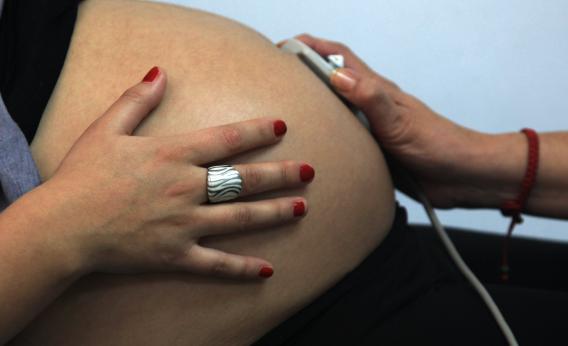Stephanie Stewart, an honors student at the Borough of Manhattan Community College on an academic scholarship, was due to deliver her son before the end of the spring semester in 2012. She needed some accommodations because she would not be able to attend every session of her women’s studies class. Stewart figured her professor would be understanding—it was a women’s studies class. But she wasn’t. The professor told Stewart that she wouldn’t be able to make up any tests or assignments she missed due to doctor’s appointments or labor and delivery. “When I received a backlash from her and no support from her, I was extremely stunned. I felt disrespected,” Stewart says.
Stewart was also being discriminated against. Title IX prohibits schools from disciplining pregnant students for medically related absences. When she appealed to the deans at BMCC, they told her to drop the class instead of intervening on her behalf. “At that given moment, I didn’t know such a thing [Title IX] existed. I was extremely angry, and in my gut, I knew it was wrong. But I didn’t have a word or policy to back me up,” Stewart says. Her husband was the one who encouraged her to research the matter. Title IX came up in her search, and so did the National Women’s Law Center.
The NWLC took her case, and as a result the CUNY system reimbursed her for the expenses she racked up when she had to take an extra class this semester so she could graduate on time. It is also now adopting a systemwide policy to address the rights of pregnant students and parents who attend the CUNYs. Stewart is graduating this spring and will attend NYU in the fall. Her son will turn 1 on Saturday.
Though the outcome is a good one for Stewart, the NWLC has seen more and more complaints like hers, says Lara Kaufmann, NWLC’s senior counsel and director of education policy for at-risk students. They started seeing an uptick in complaints when a popular blogger called the Feminist Breeder wrote about her own experience with pregnancy discrimination, and the NWLC reached out to her and helped her advocate for herself, which she also wrote about.
That the Feminist Breeder’s experience was searchable online raised awareness in a big way. “What we notice at the post-secondary level a lot, school administrators want to give professors the discretion to set their own absence policies and make up work policies,” Kaufmann says “And either those professors aren’t aware or don’t care that they have to comply with Title IX and its regulations.”
In some ways, these instances of pregnancy discrimination in schools are much easier to resolve than the instances of pregnancy discrimination in the workplace, because Title IX is pretty clear on this—schools must let pregnant students reschedule exams. Liz Watson, a senior adviser to the education and employment team at NWLC, says the employment-related laws are not so clear-cut. Though the Pregnancy Discrimination Act is meant to protect the jobs of pregnant women, it doesn’t always work out that way.
Employers must provide “reasonable accommodations” to disabled workers according to the 2008 amendments to the Americans with Disabilities Act, and employers should give pregnant workers with temporary disabilities—say, difficulty lifting heavy weights or the need for more bathroom breaks—the same rights. But some employers interpret the law very narrowly, so that they only have to give pregnant workers these accommodations if they have already given accommodations to a worker in a nearly identical situation.
The NWLC just won a case reinstating the job of Amy Clark, a pregnant hospital worker whose bosses put her on unpaid leave when her doctor said she could no longer lift more than 20 pounds. The hospital said that if she did not return to work without restrictions before her baby was due, she’d be fired. But not every recent case like Clark’s has had a happy outcome: Victoria Seredny, a nursing-home activities director, was fired because she could not move heavy objects, per doctor’s orders, during her high-risk pregnancy. She lost her wrongful-termination suit.
There’s some hope that legal protection for pregnant women will improve. The Equal Employment Opportunity Commission has recently made pregnancy discrimination an enforcement priority, and Congress will see a reintroduction of the Pregnant Workers Fairness Act, which seeks to clarify existing pregnancy discrimination laws, this term.
As Liz Watson points out, California, which already has a state law that clearly says what accommodations employers must make for pregnant workers, has seen a drop in litigation since the law was introduced more than a decade ago. When you’re pregnant, the last thing you want to deal with is an unnecessary job disruption that can lead to financial trouble once the baby arrives. Having an easily applicable standard for treatment of pregnant workers is better for both employers and working moms-to-be.
